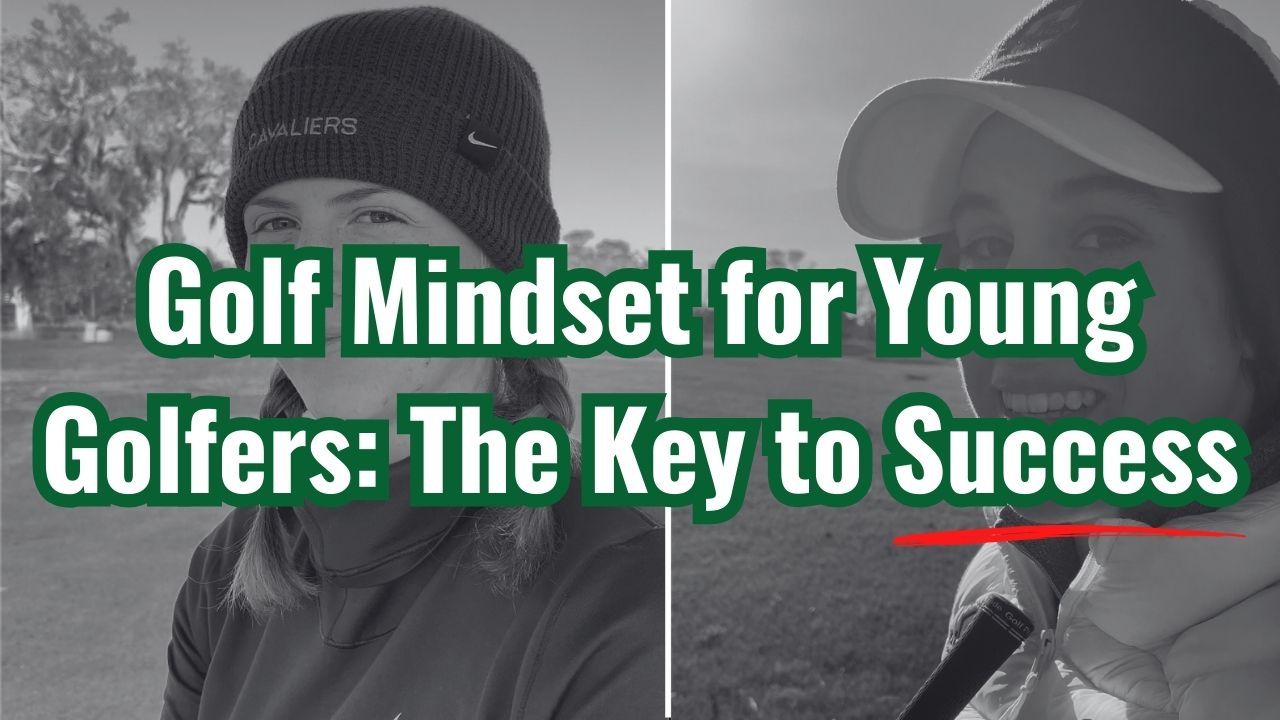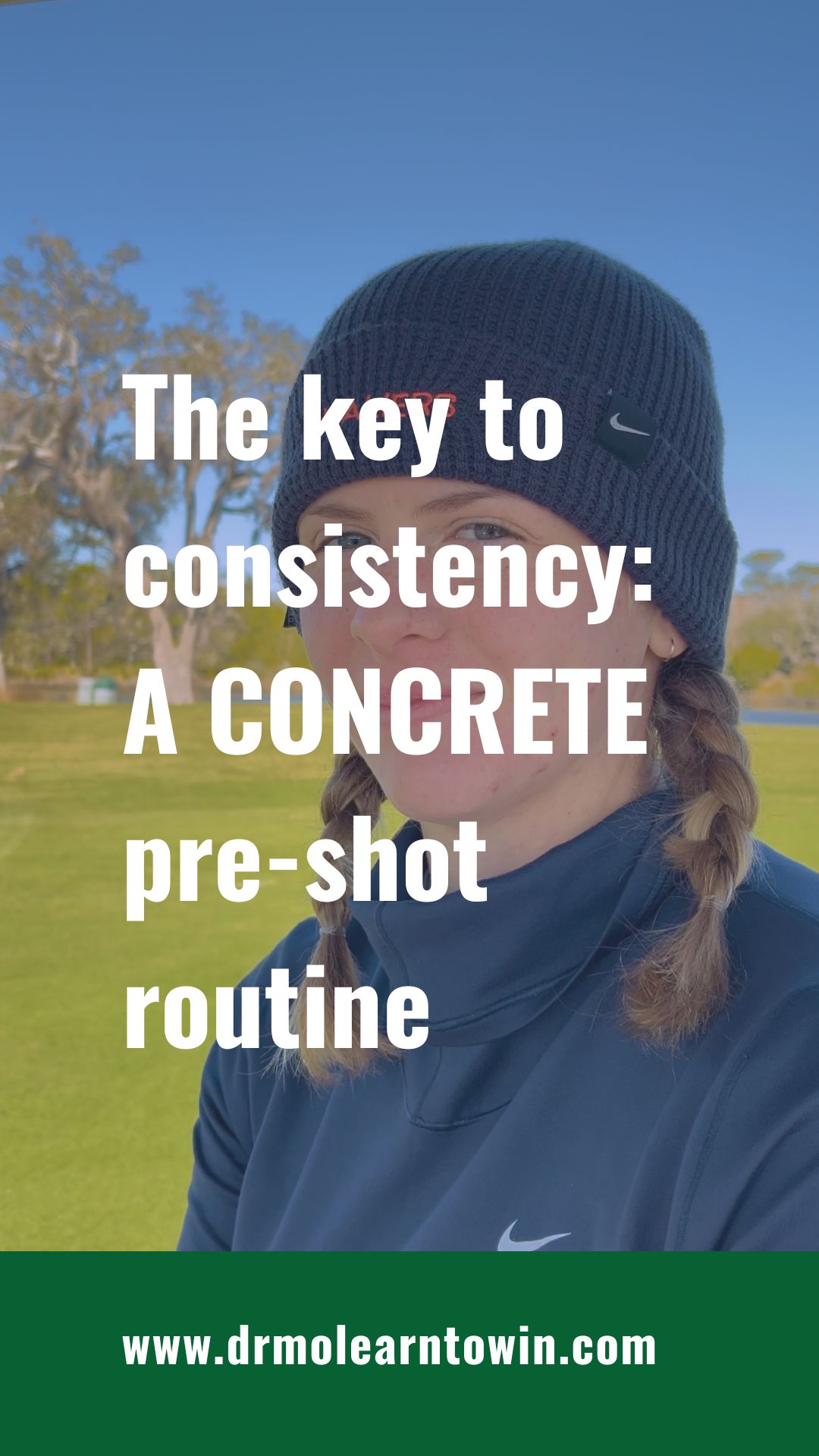Golf Mindset for Young Golfers: The Key to Success

Have you ever watched a golf tournament and wondered how professional players maintain their composure under immense pressure? I recall one Sunday afternoon, my palms sweating as I watched a nail-biting finish. The mental game seemed just as complex, if not more so, than the physical aspect. This is where sports psychology comes into play. In this post, I'll share my golf mindset insights as a sports psychologist who has worked with some of the top players in golf.
For young golfers, developing this mental toughness early on can be particularly beneficial, helping them build resilience and confidence that will serve them well throughout their golfing journey.
To illustrate the impact of developing a strong golf mindset, I'd like to share a video with one of my students, Taylor, who has been a part of my program for about four years. In this video, Taylor shares how our work together has helped her enjoy the competition more and manage pressure effectively.
Understanding How a Golf Mindset Can Improve Your Game: Insights for Young Golfers
Performance and Confidence: Which Comes First?
Have you ever wondered if confidence drives performance or if it’s the other way around? This is a question that many golfers grapple with. My answer leans towards confidence stemming from preparation and knowledge. When players are well-prepared, they tend to feel more confident, especially in high-pressure situations.
Think about it: When you practice diligently, you build a reservoir of skills. This reservoir becomes your safety net during competitions. Legends like Tiger Woods and Jack Nicklaus faced their share of challenges. They didn’t just wake up one day as champions. Their journeys were filled with learning curves and setbacks. So the next time you play golf, remember that confidence is not just a feeling; it’s a product of hard work.
The Role of Experience in Building Confidence
Experience plays a significant role in shaping a golfer's mindset. Each round of golf, whether you achieve a good or bad scorecard, contributes to our understanding of the game. It’s through these experiences that we learn what works and what doesn’t. I suggest that reflecting on past performances can help athletes regain lost confidence. By journaling their best and worst rounds, players can pinpoint what led to their successes or failures.
- Reflection: Take time to analyze your rounds.
- Identify Patterns: What strategies worked? What didn’t?
- Create Routines: Develop effective routines based on your findings.
This reflective practice is a crucial part of the mental game of golf. It allows us to build a solid foundation of confidence, which can be especially helpful when facing pressure. After all, golf is as much a mental game as it is a physical one.
Learning from Failures: The Stories of Legends Like Tiger Woods
Failure is often viewed as a setback, but in the world of golf, it can be a powerful teacher. Tiger Woods, one of the greatest golfers of all time, has faced numerous challenges throughout his career. From injuries to personal struggles, Woods has had to navigate a complex journey. Yet, each failure has contributed to his growth as a player and as a person.
I highlight the importance of separating an athlete's identity from their performance. This is vital for maintaining mental health. When players tie their self-worth to their scores, it can lead to anxiety and burnout. Instead, having a well-rounded identity helps in coping with the pressures of the sport.
As we reflect on the stories of greats like Woods, it becomes clear that learning from failures is essential. They remind us that every setback is an opportunity for growth. The key is to embrace these experiences and use them to fuel our passion for the game.
In conclusion, understanding the performance mindset involves recognizing the interplay between performance and confidence. It’s about valuing experience and learning from failures. By adopting these principles, we can enhance our game and enjoy the journey that golf offers.
Separating Identity from Performance: Stay in the Present on the Golf Course
In the world of golf, it’s easy to let scores define us. I’ve seen it happen time and again. A bad round can lead to feelings of inadequacy, while a great score can inflate our egos. But what if we could separate our identity from our performance? I believe that our self-worth shouldn’t be tied to our golf scores. To play better golf, it’s crucial to separate our personal value from our performance on the course.
The Risk of Defining Oneself by Scores
When we tie our identity to our performance, we risk losing sight of who we are beyond the golf course. Think about it: if you have a bad day on the greens, does that mean you’re a bad person? Of course not! Yet, many golfers fall into this trap. Instead, we should cultivate identities that encompass various aspects of our lives. This could include being a friend, a family member, or even a passionate hobbyist. By doing so, we create a buffer against the emotional rollercoaster that comes with the game.
- Embrace Multiple Identities: Explore interests outside of golf.
- Set Boundaries: After a round, put your clubs away and shift your focus.
- Reflect on Your Worth: Remember that your value isn’t tied to your score.
Work-Life Balance Strategies: 3 Tips to Improve
Finding a healthy work-life balance is essential for golfers, especially those competing at high levels. In my experience, professional golf can be all-consuming. The pressure to perform can lead to burnout, affecting both golf performance and personal life. So, how can we achieve balance?
- Set Clear Boundaries: Designate specific times for practice and personal life.
- Prioritize Family and Friends: Make time for loved ones. They provide support and perspective.
- Engage in Other Activities: Pursue hobbies that bring joy and relaxation.
When we develop this mindset, we can create a more rounded life. It’s about more than just golf; it’s about being a whole person.
Creating Mental Breaks to Play Better
Have you ever felt overwhelmed during a golf game? I know I have. If you want to improve your golf, incorporating mental breaks is crucial for maintaining performance. This doesn’t mean stepping away from the game entirely. Instead, it’s about finding moments to breathe and refocus. Here are some ways to create those mental breaks:
- Practice Mindfulness: Take a few minutes to meditate or focus on your breath.
- Journaling: Write down your thoughts and feelings about your performance.
- Visualize Success: Spend time imagining successful shots and positive outcomes.
These practices can help clear your mind and enhance your focus. It's important to acknowledge that mental toughness is a skill that can be developed. It’s not just about talent; it’s about preparation and mindset. A well-executed pre-shot routine helps in maintaining this mental clarity, allowing you to stay focused under pressure.
To illustrate the impact of developing a precise mental approach, let's hear from one of my students who has seen significant improvement in their game through our work together.
For more strategies on how to improve your game, check out our blog post on How to Win at Golf, which provides additional insights into developing a winning mindset.
In conclusion, separating our identity from performance is vital for a healthy athletic mentality. By embracing our multifaceted identities, establishing work-life balance, and creating mental breaks, we can enhance our performance and overall well-being. Remember, it’s not just about the scores; it’s about the journey we take along the way.
Navigating Pressure as a Professional Athlete to Play Your Best Golf
The Unglamorous Reality of Professional Golf
When we think of professional golf, we often picture the glitz and glamour of tournaments, the lush greens, and the adoring fans. But the truth is that the life of a professional golfer is much more challenging than it appears. It’s not just about hitting the ball well; it’s about managing an immense amount of pressure.
Professional golfers face a unique challenge every day, as their performance directly impacts their livelihood. This pressure can strain their golf mental resilience, leading to anxiety and burnout if not managed properly. It’s not just about winning; it’s about maintaining a competitive edge in a field where consistency is key.
Strategies for Confidence on the Golf Course
So, how do professional golfers cope with this pressure? One of the key strategies is to focus on preparation. I emphasize that confidence comes from knowledge and preparation, not just talent. “Players who are well-prepared often exhibit more confidence during high-pressure situations.”
Here are some effective strategies that can help manage expectations:
- Set realistic goals: Instead of aiming for perfection, focus on achievable milestones. This can help reduce the pressure to perform flawlessly.
- Practice mental toughness: Mental toughness is a skill that can be developed. It’s about training your mind to handle pressure. Techniques like visualization and positive self-talk can be beneficial.
- Reflect on past performances: Keeping a journal of your best and worst rounds can help you identify patterns in your performance. This reflection can build confidence and help you create effective routines.
The Importance of Support Systems in Balancing Life and Career
To improve your golf performance under pressure, having a strong support system is crucial. I emphasize the importance of family and friends in helping manage the complexities of an athlete’s life. It’s easy to get lost in the world of golf, but having people who understand your struggles can make a significant difference in your ability to improve your golf game.
Support systems can take many forms:
- Family: They provide emotional support and a sense of normalcy. They remind you that you are more than just your performance on the golf course.
- Friends: Having friends who are not involved in golf can help you maintain a balanced perspective. They can provide a break from the pressures of the sport.
- Coaches and mentors: They offer guidance and can help you navigate the ups and downs of your career.
To develop the best mindset for golf, young athletes must develop independence. I advise parents of young athletes to step back and allow their children to develop independence. Over-involvement can lead to burnout. It’s essential to let young golfers find their path while providing support when needed.
In conclusion, navigating the pressures of being a professional athlete, especially in golf, is no easy feat. It requires a combination of preparation, mental toughness, and a solid support system. By understanding the unglamorous reality of the sport and implementing effective strategies, golfers can cultivate a strong golf mentality that not only enhances their performance but also promotes overall well-being.
Tips for Young Athletes and Their Parents
Understanding the Proper Parental Role in Youth Sports
As parents, we often want the best for our children, especially when it comes to sports. But what does that really mean? Understanding the proper parental role in youth sports is crucial. It’s not just about cheering from the sidelines or driving them to practice. It’s about striking a balance between support and independence.
To take a young golfer's game to the next level, it's essential for young athletes to develop autonomy. I emphasize the importance of stepping back as a parent. I suggest that parents should avoid micromanaging their child's golf career. Instead, they should focus on being supportive without taking over. This approach fosters a sense of autonomy in young athletes. After all, how can they learn to navigate challenges if we’re always there to solve their problems?
Stages of Involvement: Caretaker to Consultant
As children grow, their needs change. The role of a parent in youth sports evolves too. Initially, we are caretakers. We drive them to practices, ensure they have the right gear, and help them with their schedules. But as they mature, we need to transition to a consultant role.
- Stage 1: Caretaker - At this stage, our involvement is hands-on. We manage logistics and provide emotional support.
- Stage 2: Guide - As they gain skills, we shift to offering advice and encouragement without taking control.
- Stage 3: Consultant - Finally, we become a sounding board. Our kids should feel comfortable seeking our advice, but they should also feel empowered to make their own decisions.
This transition is vital. It helps young athletes develop decision-making skills and fosters a sense of responsibility. It also allows them to own their journey in sports. And let’s be honest, who doesn’t want their child to feel confident in their abilities?
Preventing Burnout in Young Golfers
Burnout is a real concern in youth sports, especially in golf. Remember, golf is a game meant to be enjoyed, not just a source of stress. The pressure to perform can be overwhelming. To improve their mental game, young athletes must manage high expectations effectively. I emphasize that these expectations can lead to anxiety and fatigue if not addressed properly. By finding ways to mitigate these pressures, young golfers can maintain a healthier mindset and perform better on the course.
First, we need to recognize the signs of burnout. If our kids seem disinterested or frustrated, it might be time to reassess their involvement. Are they playing for fun, or are they feeling pressured to win? It’s essential to keep the joy in the game.
Encouraging a balanced approach is key. Allow them to take breaks when needed. This could mean stepping away from the course for a week or two. It’s okay to prioritize mental health over performance. After all, a happy golfer is often a successful golfer.
Moreover, fostering a healthy work-life balance is crucial. I'd suggest creating physical boundaries, like putting clubs away after practice. This simple act can help young athletes mentally shift focus to other aspects of their lives. It’s about creating space for growth beyond the golf course.
Cultivate a Strong Mindset to Enjoy the Game of Golf
In conclusion, supporting young athletes requires a thoughtful approach. Understanding the proper parental role, transitioning from caretaker to consultant, and preventing burnout are all essential components. As we navigate this journey, let’s remember that the ultimate goal is to help our children develop a positive golf mindset. This mindset will not only enhance their performance but also enrich their lives. By fostering independence and ensuring they enjoy the game, we can help them thrive both on and off the course.
Mastering the Mental Game to Play Better Golf
Developing a strong golf mindset is akin to training at the gym; it requires consistent effort and practice to build mental resilience. By focusing on golf psychology, you can improve your mental game, staying focused even after a bad shot. This mindset is crucial for lowering your handicap and achieving your best score. Whether you're a seasoned player or just starting out, mastering the mental game can help you become a resilient golfer. Even the best golfers recognize the importance of mental preparation in their golf instruction. Our Score Better Video Program establishes realistic goals and provides tools to help you improve your mental toughness, which will ultimately help you play better golf. By joining our program, you'll not only improve your mental game but also enjoy and learn from the process, ensuring that years of playing golf are filled with growth and success.



